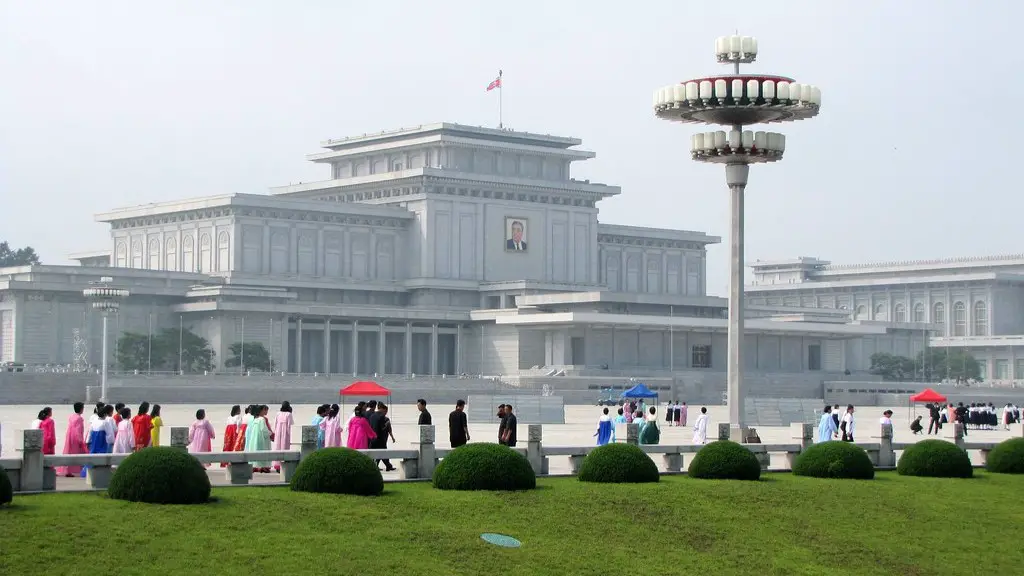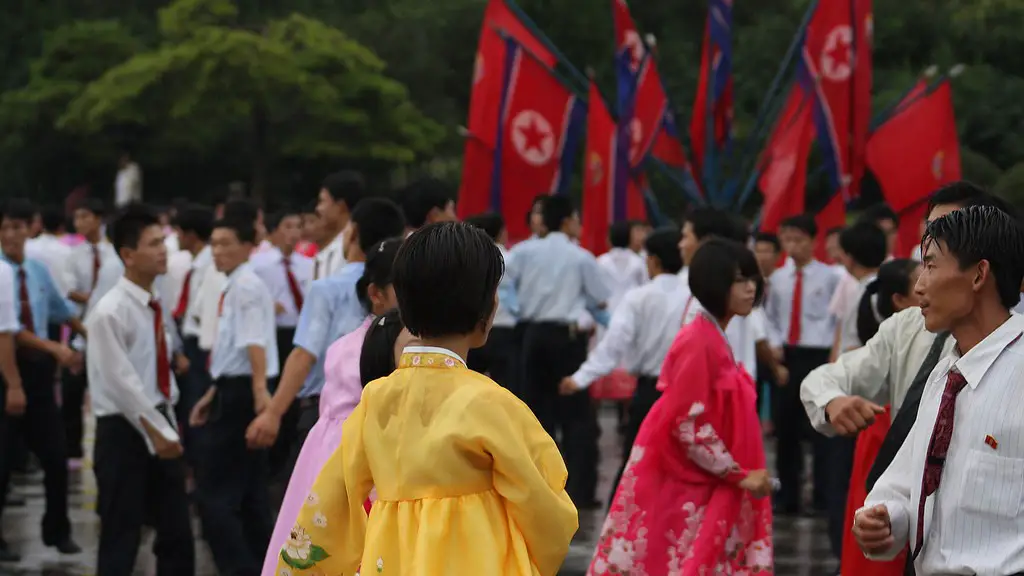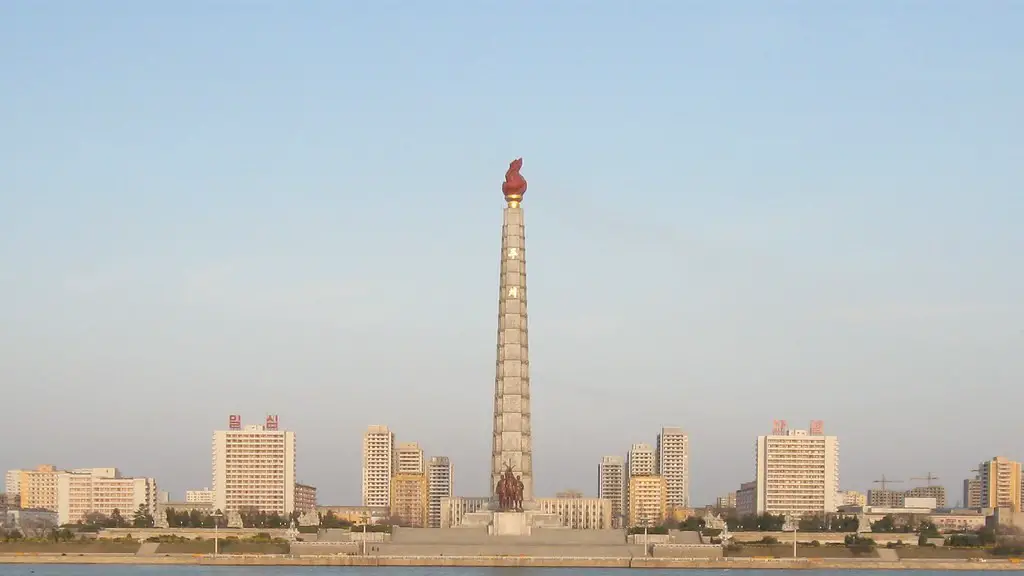North Korea is widely seen as one of the most isolated and oppressive countries in the world. Questions have been raised regarding the cause of this regime’s prosperity and stability. Some experts believe that corruption is one of the principal reasons for North Korea’s political and economic development. This article will look at the reasons behind North Korea’s corrupt practices, and how they impact the stability of the country.
One of the primary drivers of corruption in North Korea is its completely centrally planned economy, which is heavily reliant on oil and coal exports. As the national budget is kept strictly under control by the ruling elite, it is hard for the public to get access to resources. This means that those with wealth and power can often bribe officials for access to government services and resources.
This is compounded by the fact that there are no legal regulations limiting bribery or other unethical practices. This creates a situation where companies, institutions, and individuals can use and abuse resources without consequence, encouraging more corruption. Furthermore, the lack of a free and independent media in North Korea restricts any efforts to curb this abuse and enforce justice.
Another issue is the patronage system that allows powerful figures and powerful families to control and direct resources and opportunities. This strengthens the privileged class, and in turn creates an environment where those in power are able to use the state’s resources to further their own interests.
Moreover, North Korea’s unique political system is built on a fundamental mistrust of its people and its leaders’ fear of dissent. This has resulted in the criminalization of virtually any form of political expression, thus undermining attempts to fight corruption.
The lack of transparency in North Korea is also a major factor in its corrupt practices. As the country does not provide any public access to financial information or accounts, it is difficult for citizens to assess the true extent of corruption in the country. This secrecy has allowed the ruling authorities to misuse public funds without detection or prosecution.
Finally, the extreme economic sanctions imposed on the country by the international community have crippled North Korea’s economy and inhibited its ability to combat corruption. This has further entrenched the entrenched structures of patronage and patronage-based corruption in the country.
Impact on Political Stability
The corruption present in North Korea is a significant threat to its political stability, as it has enabled the powerful elite to get away with illegal activities such as embezzlement, bribery and fraud. Moreover, the presence of pervasive corruption in North Korea has deeply eroded trust and respect for the government among its citizens, resulting in a lack of investment in the country and a decrease in the quality of life within its borders.
Furthermore, the extreme secrecy that surrounds North Korean politics has enabled the ruling elite to stay in power and continue its corrupt practices while stifling any kind of public debate or accountability. This has made it difficult to identify and prosecute officials who are involved in corrupt activities, thus discouraging public criticism of the government and any kind of anti-corruption drive.
In recent years, the North Korean government has taken efforts to address the issue of corruption. These have included tougher punishments for corruption-related offenses, increased transparency, and the enforcement of anti-corruption legislation. However, there is still much that needs to be done to ensure that corruption does not continue to undermine the stability of North Korea’s political system.
Impact on Economic Prosperity
North Korea’s rampant corruption poses a major threat to its economic development, as it discourages investment and encourages a lack of trust in the government. This has caused many businesses to flee the country, resulting in a decline in foreign investments and a decrease in overall economic activity.
The presence of pervasive corruption in North Korea also exacerbates inequality, as those with wealth and power can more easily secure resources. This increases the gaps between the rich and the poor, thus hampering economic growth and development. Furthermore, corrupt officials have been known to use public funds to engage in activities that have detrimental long-term economic consequences.
The government has attempted to make an effort to root out corruption in recent years, but it has been largely unsuccessful. This is due to the lack of a free and independent media which monitors and reports on malpractice, and the country’s stringent censorship policies. Furthermore, the lack of an effective legal system has meant that corrupt officials are rarely brought to justice, allowing them to continue their illicit activities.
Role of the International Community
The international community can play a major role in tackling corruption in North Korea. This can be done through cooperation with the government, providing economic aid, and encouraging more openness and transparency. By doing this, organizations such as the United Nations and the European Union can help to create conditions for economic growth and stability, thus diminishing the scope for corruption.
In addition, the international community can assist in establishing a legal framework that punishes corrupt officials and reduces incentives for corrupt practices. This can be done by providing technical assistance to the North Korean government and encouraging greater compliance with the international anti-corruption conventions.
Finally, it is important to recognize and address the root causes of corruption in North Korea. Achieving this requires greater access to and dialogue with North Korea, as well as more constructive and sustained international engagements with the North Korean government.
Way Forward
The fight against corruption in North Korea is hampered by the lack of transparency and accountability in the country. If the government is to succeed in tackling corruption, it must focus on improving the legal and regulatory framework, enforcing the rule of law, and curbing any political interference in the judicial system. Moreover, it is essential that efforts are made to build institutional capacity and promote effective governance.
Furthermore, the international community can play an important role in supporting these efforts, through providing technical assistance and by encouraging the government to engage in greater economic and political dialogue with its citizens. By doing so, it can help to create an environment that is conducive to growth and stability, and one in which corrupt practices are no longer tolerated.
Lastly, the North Korean government must work to address the underlying social and economic issues which have encouraged corruption in the first place. These include extreme poverty and inequality, lack of access to public services, and restrictions on economic activity. By tackling these problems, the government can work to create a more prosperous future for its citizens, and to ensure the stability and prosperity of the country for years to come.
Effects on Human Rights
The endemic corruption present in North Korea has had a significant detrimental impact on human rights in the country. The extreme secrecy surrounding the government means that human rights abuses are often not reported or investigated, and those responsible are rarely brought to justice.
In addition, corruption has also impeded North Korea’s efforts to improve access to basic services such as healthcare, education and food. This has had a negative impact on the rights of citizens, as those in power are able to use state resources to further their own interests.
The situation is made worse by the government’s harsh restrictions on freedom of expression and assembly. These have stifled any kind of public debate or criticism of the government, making it harder to address human rights abuses and tackle corruption in the country.
It is therefore essential that the international community takes a more active role in promoting human rights in North Korea. This can be done by providing technical assistance in developing legal and regulatory frameworks, encouraging political dialogue between the government and the people, and pressuring the government to improve its human rights record.
Suggestions for Reform
In order to make headway in curbing corruption in North Korea, it is essential that the government takes steps to implement sweeping reforms to its legal and institutional structures. This requires strengthened law enforcement and judicial systems, increased financial transparency, and better monitoring and accountability mechanisms.
In addition, North Korea must take measures to promote economic activity and to incentivize investment. This will enable the population to access basic services such as healthcare and education, hence increasing the overall quality of life.
Finally, North Korea must also work to improve access to information and freedom of expression, in order to make the government more accountable and to allow for a more open dialogue between the government and its citizens. This can be done by loosening restrictions on the media and by establishing an independent media watchdog.
It is clear that tackling corruption in North Korea requires a concerted effort from both the government and the international community. However, with the right measures, progress can be made and the corrupt practices that have plagued the country for so long can eventually be eradicated.





